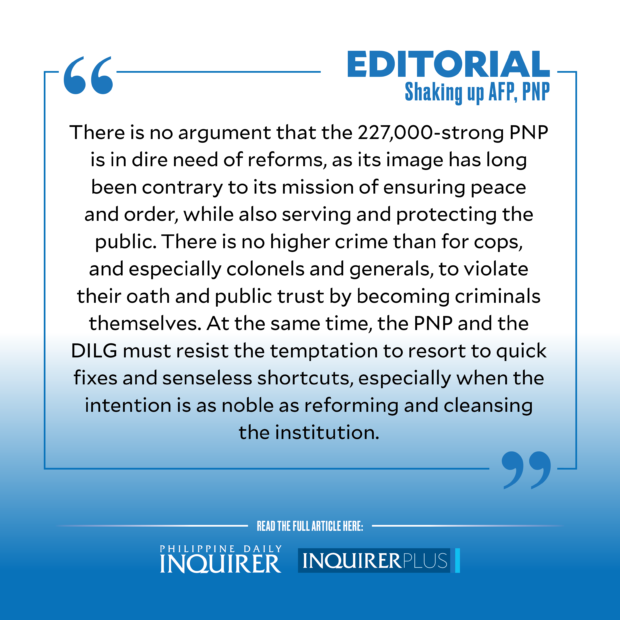Shaking up AFP, PNP

On Friday, Malacañang made the surprise announcement that President Marcos Jr. had reappointed Gen. Andres Centino as AFP chief of staff, five months after replacing him with Lt. Gen. Bartolome Bacarro. The change of command, usually attended by pomp and pageantry, was said to have taken place at a club house instead of the AFP Grandstand on Saturday and was over in an hour. Mr. Marcos was not in attendance.
With no forthcoming explanation from Malacañang on this game of musical chairs, rumors swirled about a brewing destabilization plot over the weekend.
Article continues after this advertisementAnd with Centino’s retirement set next month, the question has been raised on whether or not he would be allowed to serve the fixed three-year term under the new Republic Act No. 11709. The commander in chief would have to spell out the reasons for his baffling decision, if he were to avert the escalation of the squabbling between the Bacarro and Centino supporters at Camp Aguinaldo, and the subsequent rumors of unrest in the military.
Over at Camp Crame, shockwaves also followed Abalos’ New Year bombshell about the need for the mass “courtesy resignation” of top police officials as a “radical way” to root out those believed to be involved in the illegal drug trade.
“I know this is sudden, but this is the only way to make a fresh start. We will do something drastic. It is a very radical approach to this problem, but I do believe we must cleanse our ranks,” Abalos said on Jan. 4.
Article continues after this advertisementWhile Abalos clarified that his call was not mandatory, who in their right mind would dare ignore this “appeal” that was forthwith upheld by the President? Philippine National Police chief Gen. Rodolfo Azurin, Jr. immediately tendered his courtesy resignation on Thursday, along with the four other highest officials in the PNP, and enjoined the rest to follow suit. Abalos said the resigned officers would stay put unless their resignations are accepted by the President. A five-member committee, he explained, would be convened to vet the officers.
But why does Abalos’ move feel like a witch hunt or a publicity stunt at best?
According to the Department of the Interior and Local Government (DILG) chief, “it’s only a few [PNP officers] who are involved, but they are in critical positions.” Azurin was more categorical, saying that “less than five ranking officers might be involved in illegal drugs.”
Clearly then, Abalos and Azurin have an idea who these officers are, so why demand the resignation of all the 955 officers just to ferret out a few bad eggs? Why burn the entire house to flush out the five rogue officers?
Could the move be an indication of just how bad the police is in building a case and finding evidence against its officers or personnel believed to be involved in illegal drugs? If no less than the President, the Interior secretary, and the PNP chief have set out to go after the narco cops based, hopefully, on solid intelligence, then why this seeming reluctance to mount a transparent investigation following due process?
Ironically, Abalos himself explained that the move was a “shortcut,” and the quickest way to cleanse the PNP that, he said, has been infiltrated by the illegal drug trade.
But it is precisely this setting aside of due process and proper procedures that have led to police abuses and corruption in previous years which, in turn, shattered the image and credibility of the police force. Police “shortcuts” and violations of protocol have resulted in police teams killing more than 6,000 suspected drug users during former President Duterte’s brutal drug war.
Assurance by officials that erring officers would be charged even after their resignations have been accepted do not wash. Isn’t it better to prosecute them while they are still within the reach and jurisdiction of the PNP?As pointed out by the Commission on Human Rights, “accountability must be carried out to [the] fullest extent.” It added: “A resignation or removal from office may only be the first step in the pursuit of justice, and not an omission of liability. In this case, if allegations are proven to be true, criminal and administrative charges should be filed against erring police officers.”
There is no argument that the 227,000-strong PNP is in dire need of reforms, as its image has long been contrary to its mission of ensuring peace and order, while also serving and protecting the public. There is no higher crime than for cops, and especially colonels and generals, to violate their oath and public trust by becoming criminals themselves.
At the same time, the PNP and the DILG must resist the temptation to resort to quick fixes and senseless shortcuts, especially when the intention is as noble as reforming and cleansing the institution.















